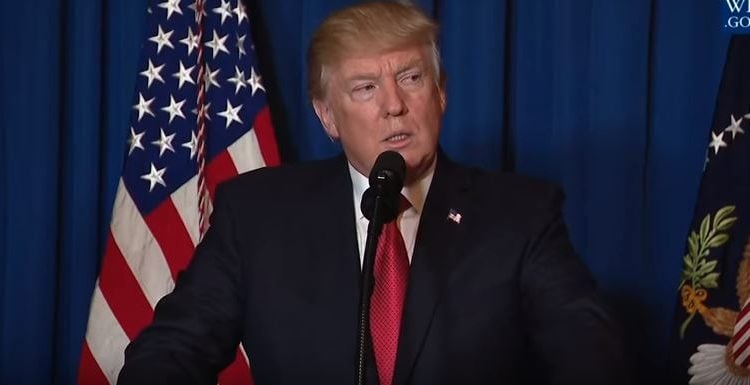While one must not underestimate the savagery of Assad, his regional and global destabilizing impact is dwarfed by the impact of the ferociously tectonic Ayatollahs.
By: Ambassador (ret.) Yoram Ettinger
The US bombing of Syria could resurrect the US’ posture of deterrence and evolve into a geo-strategic game-changer in Syria, the Middle East and throughout the globe, provided that President Donald Trump learns from – rather than repeats – critical errors committed by his predecessors in their battle against Islamic terrorism.
Trump’s predecessors assumed that their counterterrorism mission could be accomplished through a series of limited, immediate and tactical operations, bringing the troops back home asap. However, contrary to their expectations, their well-intentioned actions undermined their comprehensive, long-term, sustained and strategic mission to clip the wings of Islamic terrorism and enhance homeland security. While they won certain battles, they failed to clip the wings of Islamic terrorism and did not win the overall war.
For example, on August 20, 1998, President Bill Clinton declared victory following the US bombing of a few terrorist bases and a deadly nerve agent VX processing plant in Afghanistan and the Sudan, in retaliation for the August 7 truck-bombings of the US Embassies in Kenya and Tanzania, which killed 224 persons. However, resting on the laurels of the tactical bombings, and failing to intensify a long-term offensive against Islamic terrorism, exacerbated the latter’s assault on the US. It led to the October 12, 2000 suicide-vessel bombing of the USS Cole (killing 17 sailors) and the September 11, 2001 suicide-aircraft bombing of the Twin Towers and the Pentagon, killing 2,996 persons and injuring some 6,000.
On May 1, 2003, President George W. Bush declared that major combat operations in Iraq ended with the US and its allies prevailing. A large “Mission Accomplished” banner provided a backdrop to Bush’s speech on the USS Abraham Lincoln. On June 5, Bush told US troops in Afghanistan: “America sent you on a mission to remove a grave threat and to liberate an oppressed people, and that mission has been accomplished.” In 2018, both Afghanistan and Iraq are major global platforms for Islamic terrorism, which is increasingly afflicting larger parts of the globe.
The George W. Bush Administration overthrew Iraq’s Saddam Hussein and purged members of Saddam’s Sunni Baath Party from the civilian and military sectors, which catapulted Iraq’s Shiite majority to domination, incentivized former Sunni government officials and military personnel to join Sunni terrorism, exacerbated Sunni-Shite violence, and provided an unprecedented springboard to the Shiite Ayatollahs’ aspirations to control Iraq as a critical bridge to Syria, Lebanon and the Mediterranean, as a prelude to an Iranian domination of the Middle East and the Muslim World.
In 2012, President Barack Obama was determined to topple Libya’s ruthless Qaddafi regime by leading a concerted bombing campaign by NATO forces. The effective bombing was initiated, irrespective of the fact that Qaddafi had been engaged in the dismantling of Libya’s nuclear, chemical and ballistic missile infrastructure since December 2003, as certified by US and international inspectors. Moreover, the vicious Libyan dictator was consumed with an intense battle against anti-US Islamic Sunni terror organizations and provided the US with vital counter-terrorism intelligence. The execution of Qaddafi, by his domestic terror-driven opponents, transformed Libya – the 4th largest country in Africa – into a leading and chaotic platform for international Islamic terrorism.
Learning from the past?
Will Trump learn – and refrain – from the critical errors of his predecessors?
Will Trump focus on the primary – rather than secondary – source of clear and present threats to the national security and homeland security of the US, the Free World and the pro-US Arab countries?
While one must not underestimate the savagery of Assad, the Butcher of Damascus, Syria’s regional and global destabilizing impact is dwarfed by the impact of the ferociously tectonic Ayatollahs, a minority regime which has repressed the Iranian people since 1979.
The Shite Ayatollahs have played a key role – next to Russia – in sustaining the Alawite (branch of Shite Islam) Assad regime, investing some $10BN, annually, in the form of credit lines, oil and military assistance, including the funding of some Russian military systems and the maintenance of Hezbollah terrorists.
In fact, regional chaos – Syrian style – has fueled the Ayatollas’ rise to regional prominence. Their expanding presence in Iraq and Syria has adrenalized their megalomaniacal aspirations, which aim at uprooting the US presence in the Persian Gulf, the Arabian Peninsula, the Indian Ocean and the entire Middle East.
Moreover, the unprecedentedly effective regional profile of the Ayatollahs brings their machete closer to the throat of every pro-US Arab regime such as Jordan, Saudi Arabia, Bahrain, Abu Dhabi, Dubai, Kuwait and Oman, fueling subversion and terrorism, and providing anti-US Islamic terror organizations with easier access to chemical and biological weaponry and ballistic capabilities.
Furthermore, the considerable entrenchment of the Ayatollahs in Iraq and Syria has been accompanied by the Ayatollahs’ upgraded destabilization and anti-US presence – directly and through terror elements – in Asia, Africa, Europe, Australia, Canada, Mexico, Central and Latin America and the USA.
The increasingly global village, and the unprecedented global proliferation of Islamic terrorism, have eliminated the option of isolation. The US and its allies are faced with the choice of confronting the Ayatollahs and Islamic Sunni terrorism in the trenches of the Middle East or at homeland. One may assess such a dilemma against the background of an old American football rule: The closer you get to the end zone of the other team, the closer you are to scoring a touchdown; however, the closer you get to your own end zone, the closer the other team is to scoring a touchdown.





